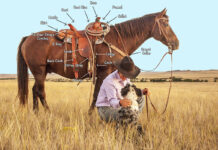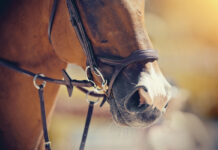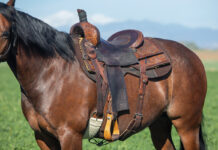 Q: I am working with a Thoroughbred hunter/jumper prospect. When we jump crossrails, he’s fine. But when we try small verticals he bolts to the jumps and then kicks his heels in the air. How can I help him stay calm and relaxed on his way down to the jumps?
Q: I am working with a Thoroughbred hunter/jumper prospect. When we jump crossrails, he’s fine. But when we try small verticals he bolts to the jumps and then kicks his heels in the air. How can I help him stay calm and relaxed on his way down to the jumps?
Go back to trotting—not cantering—crossrails and ground poles until your horse sees them as just another ho-hum part of his schooling routine. Incorporate them into your flatwork, so that you’re trotting around the arena, circling and bending, and then you just happen to trot a crossrail. Then continue on around the arena. To help regulate your horse’s pace, set a placement (ground) pole about 9-10 feet out from both the take-off and landing sides of the crossrails. He should trot the pole, hop over the crossrail and then hop over the pole on the other side. If he lands cantering, that’s fine. But gently bring him back to his rhythmical trot and keep cruising around the arena.
The next step is to integrate a low, simple vertical (about 2’3”) into this set-up. Now your routine may include some ground poles, a couple of crossrails and your vertical. Use your placement poles (rolled out to about 10-feet now) on either side of the vertical. This will help slow your horse and keep him focused on jumping correctly. Eventually you can remove the placement poles and mix trotting some of your low jumps with cantering a few. If your horse still gets quick and strong over the verticals then enlist the help of a local professional in your community. He or she may spot problems in your position, equipment or flatwork fundamentals that are influencing your horse’s performance.
–Cindy Hale
Ask your horse and riding questions on the HorseChannel.com Forums >>
See more Expert Q&As >>
Submit your Ask the Expert question >>






I agree with Cindy Hale’s advice.
Interesting reading. I do not really jump, but it is good advise.
Thanks for the great advice. This will help my jumper too who jumps and bolts upon landing.
Try putting trotting poles in front of the jump or a ground pole.
THANKS!!!!